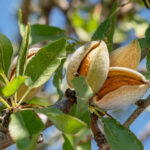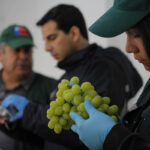Study finds common insecticide harmful to bees in any amount

A type of insecticide made for commercial plant nurseries is harmful to a typical bee even when applied well below the label rate, according to a new UC Riverside study.
Widely used by commercial growers, neonicotinoids are insecticides that protect against plant-consuming insects like aphids but seriously harm beneficial insects.
This study examined neonicotinoid application in potted ornamental plants, which can represent more potent sources of exposure to the toxin for bees.
“Neonicotinoids are often used on food crops as a seed treatment,” UCR entomologist and lead study author Jacob Cecala said.
“But they’re usually applied in higher amounts to ornamental plants for aesthetic reasons. The effects are deadly no matter how much the plants are watered.”
Though increased water decreased the pesticide’s potency in the nectar of the flowers, the negative effects on bees were still observed.
“Unfortunately, we observed a 90% decrease in the bees’ reproduction with both high and low levels of irrigation,” Cecala said.
This study is one of the few to examine neonicotinoid effects on solitary bees which are more representative of the ecosystem in California and are potentially more vulnerable to pesticides.
In this study, the researchers used alfalfa leafcutter bees, which make their nests in tunnels and lay eggs one at a time.
The first time the researchers tried this experiment, they used the concentration of insecticide recommended on the product label. All the bees died in a matter of days.
The next time they ran the experiment, they used a third of the recommended dose and still found negative effects on reproduction, the ability of the bees to feed themselves, and overall fitness.
“It almost completely wiped them out,” Cecala said.
Though this study used a neonicotinoid product formulated for nurseries, formulations of similar products for home gardeners also tend to be highly concentrated.
The researchers recommend that nurseries quantify the number of pesticides that are making their way into flowers given their watering and pesticide regimes.
They also recommend consideration of alternative management practices that reduce harm to bees and the ecosystems dependent on them.
“It’s not as simple as ‘don’t use pesticides’ — sometimes they’re necessary,” Cecala said.
“However, people can look for a different class of insecticide, try to apply them on plants that aren’t attractive to bees, or find biological methods of pest control.”











































